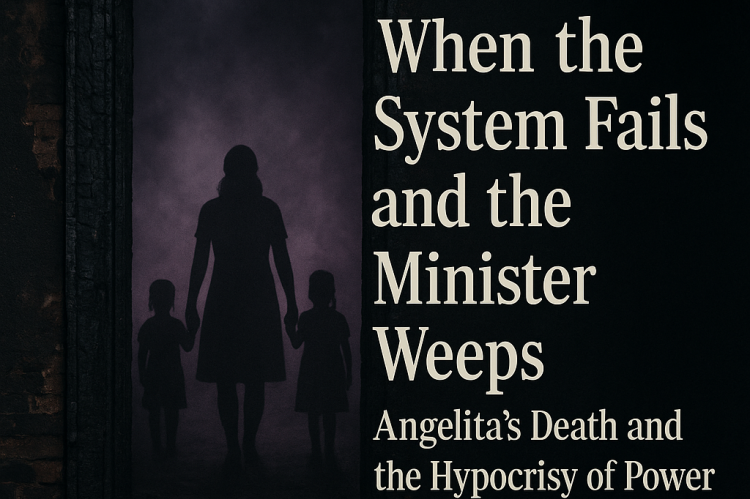📰 When the System Fails and the Minister Weeps: Angelita’s Death and the Hypocrisy of Power
A nation’s tears cannot cleanse the hands that built a system of neglect
By Omar Silva | Editor/Publisher
National Perspective Belize
Belize City: Thursday 23rd. October 2025
A Tragedy Foretold
San Felipe Village now wears the color of mourning. A mother and her two children — Angelita Magaña, six-year-old Tishan, and seventeen-year-old Shadia — are gone, burned alive in a home that was supposed to be their refuge. The accused: Francisco Godoy, Angelita’s former common-law husband, recently released from prison after serving time for rape and domestic violence. The police call it arson. The nation calls it horror.
And in the wake of this unspeakable tragedy, the Health Minister and Orange Walk area representative, Kevin Bernard, publicly admitted that “the system failed.” His words, though seemingly compassionate, reveal the very contradiction that continues to haunt Belize: ministers who lament failure while standing atop the machinery that allows it to happen.
Institutional Failure Dressed as Sympathy
Bernard’s statement — “the system failed Magana” — sounds like an act of conscience, yet it exposes an even greater truth: the government has had years to repair this very system. The police received prior complaints. The perpetrator’s criminal record was known. The courts were closed when Angelita sought a restraining order — and no emergency mechanism existed to protect her.
These are not random oversights; they are administrative choices. For every policy left unfunded, for every domestic-violence unit left understaffed, for every judicial gap left unaddressed — there is a name, a Cabinet, a budget, and a decision. When ministers describe these failures as though they were accidents of fate, they wash their hands of responsibility while standing before a nation that bleeds.
Belize’s prevention infrastructure remains skeletal. Shelters are few, the domestic-violence hotline under-resourced, and inter-agency coordination nearly absent. Victims are left to navigate an obstacle course of bureaucracy when all they need is protection and compassion.
The Hollow Politics of Compassion
Each time a woman dies at the hands of an abuser, the government issues the same statement: “We must do more.” But these words have lost their meaning in a political system that treats domestic violence as a headline, not a policy priority.
Where is the emergency protocol for restraining orders when courts close? Where are the special domestic-violence courts long promised under successive administrations? Where are the mental-health interventions, the safe houses, the social workers empowered to act without waiting for paperwork and signatures?
The minister speaks of a “whole-of-society approach,” but that begins with a whole-of-government commitment — not in sentiment, but in funding, structure, and enforcement. The state cannot outsource moral duty to the public when it controls the laws, the police, the courts, and the purse strings.
The Reform Belize Still Awaits
Real reform means replacing speeches with systems. It means establishing:
- 24-hour protective order access even when courts are closed.
- An integrated domestic violence emergency unit combining police, social services, and health workers under one national command.
- Electronic monitoring for repeat offenders released on bail or parole.
- Mandatory treatment and psychiatric evaluation for convicted abusers.
- Victim assistance stipends funded from forfeited bail and seized assets.
These measures are not luxuries — they are the minimum defense a nation owes to its women and children. Belize has written enough condolence statements. What the people demand now are guarantees — mechanisms that ensure no woman’s cry for help goes unanswered because “the judge was not there.”
Kicker: When Ministers Weep, the People Must Remember
Kevin Bernard’s tears, and those of his Cabinet colleagues, cannot wash away institutional indifference. Angelita’s blood is not on the community’s conscience — it stains the fabric of a state that preaches empathy but refuses to govern with urgency.
Belize must stop confusing sorrow for accountability. The time has come to turn public grief into public policy — and to remind every minister who says “the system failed” that they are the system.
SIDEBAR BOX: What Justice Demands – Practical Reforms Now
1. Domestic Violence Emergency Act (2026):
Legislate mandatory protective mechanisms during court closures or public holidays.
2. Safe House Network:
Create a publicly funded, district-based network of safe houses operated under the Ministry of Human Development.
3. Survivor Support Fund:
Provide immediate stipends for women and children displaced by domestic violence, financed through seized criminal assets.
4. Inter-Ministerial Response Protocol:
Link police, healthcare, and legal aid through a single national digital reporting system.
5. Rehabilitation & Re-entry Oversight:
Mandate psychiatric evaluation and monitoring of convicted abusers upon release to prevent recidivism.
- Log in to post comments

